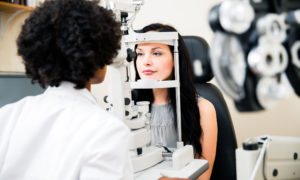Jan. 9, 2019

New evidence suggests that frequent consumption of diet soda adversely affects the eyes, according to the American Optometric Association.
Published online in the journal Clinical and Experimental Ophthalmology, a new study reports an association between adult patients with diabetes (PWDs) who drink more than four cans of diet soda weekly and a nearly twofold risk of having proliferative diabetic retinopathy (PDR). The reported association intrigues researchers who place increasing scrutiny on the impact artificial sweeteners may have on glucose intolerance, and opens another avenue for doctors of optometry to provide timely, effective interventions.
Diabetic retinopathy, a progressive retinal disease, is the most common cause of vision loss among PWDs and a leading cause of blindness among working-age adults. The result of uncontrolled swelling in the retina from leaking blood vessels, PDR can go unnoticed by patients, and if left untreated, can cause severe vision loss or blindness. However, early detection and intervention through regular, comprehensive eye exams can reduce the risk of blindness by 95 percent.
Other Articles to Explore
Proper management and education helps keep patients’ diabetes under control, and a large part of that involves reinforcing the importance of self-monitoring blood glucose (SMBG) and understanding the effects diet has on blood glucose levels. Researchers sought to determine how diet soda consumption—often marketed as a healthier alternative to regular soda—might influence the risk of microvascular complications.
According to the study, researchers recruited 609 PWDs—nearly a quarter of which had PDR—from the Australian Diabetes Management Project and analyzed their food consumption, including soft drinks. Researchers found individuals consuming four-plus, 1.5 L cans of diet soda weekly had more than a twofold increased risk of having PDR. That said, diet soda consumption was not associated with higher odds of less severe diabetic retinopathy or any level of diabetic macular edema.
“Overall, these findings support the growing body of evidence suggesting that regular and frequent consumption of artificially sweetened beverages may have detrimental vascular outcomes,” the study states. Specifically, the authors note several analyses that show routine consumption of non-nutritive sweeteners may be associated with increased body-mass index and cardiometabolic risk, as well as worse cardiovascular profile in patients with diabetes.
Interestingly, the study found no association between soft drink consumption and any level of diabetic macular edema, which authors suggest could be related to different pathophysiological processes underlying the two conditions. Moreover, the study did not find an association between regular soda consumption and presence or severity of diabetic retinopathy; however, this could be attributed to smaller numbers in the high-consumption category.
Given the novelty of the research, authors note further longitudinal studies are necessary to determine whether diet sodas are unhealthy substitutes for regular sodas in PWDs.
You can read more about optometry’s evolving role in diabetes care in the November/December AOA Focus feature, “21st Century Optometric Care for the 21st Century Pandemic.”



























